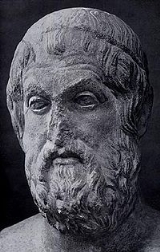
tragedians
whose plays have survived. His first plays were written later than those of Aeschylus
, and earlier than or contemporary with those of Euripides
. According to the Suda
, a 10th century encyclopedia
, Sophocles wrote 123 plays during the course of his life, but only seven have survived in a complete form: Ajax, Antigone, Trachinian Women, Oedipus the King, Electra, Philoctetes and Oedipus at Colonus.
Truly, to tell lies is not honorable; But when the truth entails tremendous ruin, To speak dishonorably is pardonable.![]()
Sons are the anchors of a mother's life.![]()
No man loves life like him that's growing old.![]()
When ice appears out of doors, and boys seize it up while it is solid, at first they experience new pleasures. But in the end their pride will not agree to let it go, but their acquisition is not good for them if it stays in their hands. In the same way an identical desire drives lovers to act and not to act.![]()
Nobly to live, or else nobly to die, Befits proud birth.![]()
Of all human ills, greatest is fortune's wayward tyranny.![]()
For kindness begets kindness evermore, But he from whose mind fades the memory Of benefits, noble is he no more.![]()
Men of ill judgement oft ignore the good That lies within their hands, till they have lost it.![]()
Fear? What has a man to do with fear? Chance rules our lives, and the future is all unknown. Best live as we may, from day to day.![]()
I am the child of Fortune, the giver of good, and I shall not be shamed. She is my mother; my sisters are the Seasons; my rising and my falling match with theirs. Born thus, I ask to be no other man than that I am.![]()

